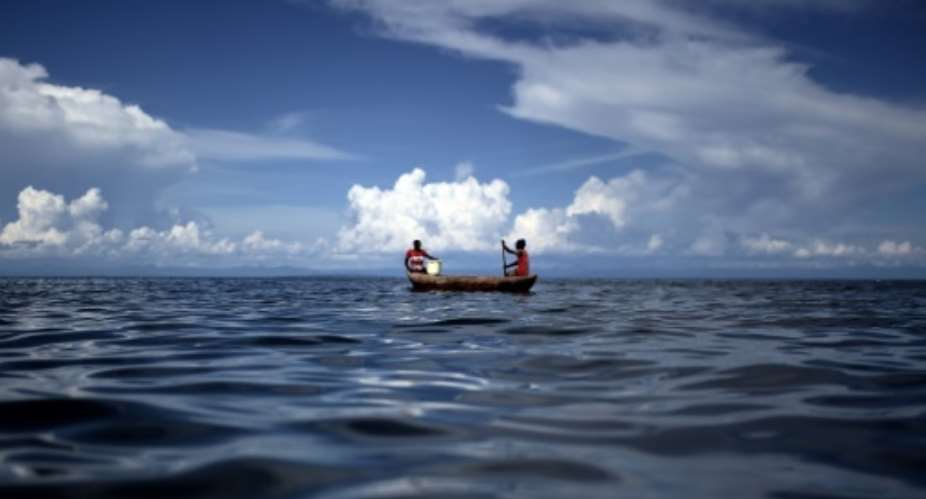The southern African country of Malawi, which holds presidential polls on May 21, is stable but poor with people dependent on agriculture and its enormous lake for their livelihoods.
One-fifth water
The long strip of a country is landlocked but around a fifth of its surface area is covered by water, mostly the vast Lake Malawi.
At roughly 580 kilometres (360 miles) long and 75 kilometres at its widest point, Lake Malawi is Africa's third-largest freshwater lake and a vital source of food and work for the country.
The lake also straddles Tanzania which claims its top half in a border dispute blamed on maps drawn up by colonial British and Germany.
The long-running feud resurfaced after Malawi in 2011 awarded British company Surestream Petroleum a licence to drill for oil and gas in the lake's north.
Agriculture-dependent
Agriculture powers Malawi's economy -- with tobacco, tea and sugar among the top crops -- and contributes over 40 percent to its gross national product.
About 85 percent of households engage in agricultural activities and most rely on subsistence farming, according to USAID.
The country is heavily reliant on foreign aid. Around half Malawi's population of 18 million lives below the poverty line, the World Bank says.
Economic growth in 2018 was forecast at 3.5 percent, slowed by reduced agricultural output after drought and an armyworm caterpillars infestation, it says.
Infrastructure is widely lacking and just 11 percent of the population have access to electricity.
China is Malawi's top trading partner.
Politically stable
Since independence from Britain in 1964, Malawi has been stable and peaceful.
Its first president was US-trained doctor Hastings Banda who held a ruthless grip on power for three decades until he was ousted in the first multi-party elections in 1994.
In 2012 vice president Joyce Banda became the first female leader -- and only the second on the continent at the time -- on the death of then president Bingu wa Mutharika.
Embroiled in a massive graft scandal, she lost power in 2014 elections to Mutharika's brother, a law professor.
Mutharika, 78, is running for a second term on May 21 although a bribery scandal, food shortages, electricity blackouts and ballooning external debt have hurt his popularity.
The official language is English.
Albino attacks
Malawi has since late 2014 seen a surge in attacks on people with albinism, whose body parts are used in witchcraft rituals to bring wealth and luck.
Of 163 cases reported since November 2014, 22 have been murders, Amnesty International said in May 2019, criticising impunity for the crimes.
Just 30 percent of those attacks have been properly investigated, according to official statistics, with only one murder and one attempted murder case successfully prosecuted.
A widespread belief in black magic has also seen people accused of being "vampires" by trying to obtain human blood for rituals, sometimes triggering vigilante violence in retaliation.
Eighty percent of the population professes to be Christian.
Ravaged by AIDS
In 2017 nearly one million people in Malawi were living with HIV, with 9.6 percent of adults aged between 15 and 49 infected with the virus that causes AIDS.
Some one million children are orphaned as a result.
US pop star Madonna set up the "Raising Malawi" foundation in 2006 for AIDS orphans and has adopted four children from the country.
Even though Malawi in 2015 raised the marrying age to 18, nearly half of its girls enter matrimony before this age, one of the highest rates in the world.
Sources: AFP, UNAIDS, UNESCO, UNICEF, UNDP, World Bank, USAID.





 Election 2024: Mahama will destroy my legacy if he wins, so, go out, register an...
Election 2024: Mahama will destroy my legacy if he wins, so, go out, register an...
 UE/R: Your 2-year 'bitterness' towards our members 'shameful' - Three teacher un...
UE/R: Your 2-year 'bitterness' towards our members 'shameful' - Three teacher un...
 'I'm not running for office for power; I just want to solve Ghana’s problems' — ...
'I'm not running for office for power; I just want to solve Ghana’s problems' — ...
 Limited voter registration exercise delays in Tema due to technical problems
Limited voter registration exercise delays in Tema due to technical problems
 Biometric Verification machines fail to function in Kadjebi
Biometric Verification machines fail to function in Kadjebi
 Voter Registration: Technical hitches impede exercise at La Dade Kotopon
Voter Registration: Technical hitches impede exercise at La Dade Kotopon
 Technical issues delay voter registration exercise in Takoradi
Technical issues delay voter registration exercise in Takoradi
 Limited voter registration exercise delays at Keta
Limited voter registration exercise delays at Keta
 V/R: Limited voter registration exercise delays in Hohoe
V/R: Limited voter registration exercise delays in Hohoe
 EC limited voter registration exercise faces massive challenges
EC limited voter registration exercise faces massive challenges
